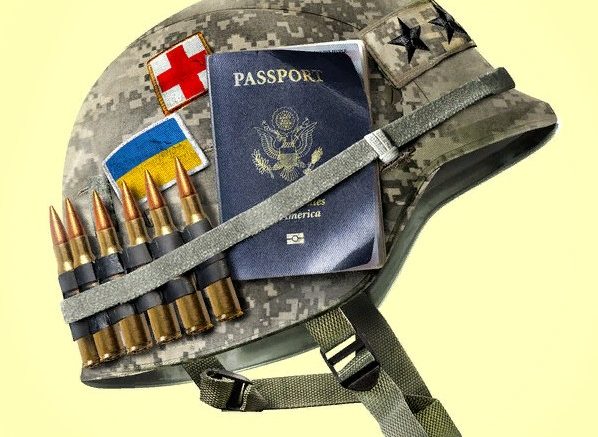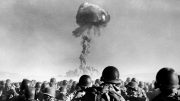Like many others around the world, I was horrified and outraged by the photographs that emerged in the previous few days from Bucha, Ukraine.
I am aware that all conflicts result in ruin and disaster, and that all wars damage and shatter the lives of innocent people. The mass graves and bound bodies left behind by the Russian soldiers who left Bucha felt like a new hell to me.
At some point, I took my gaze away from the images. Each of us has our own set of limitations. Then I couldn’t stop visualizing the faces of other Ukrainians on those fallen bodies, the faces of individuals I know who are still alive in the country.
I recently got home from Lviv, Ukraine, where I spent a few weeks training Ukrainian civilians in basic urban warfare and survival tactics alongside friends and other combat veterans from Iraq and Afghanistan.
We flew there on our own dime and at our own desire because we saw a sovereign democracy under siege and believed it to be unjust.
Because Lviv is more than 300 miles away from Bucha, the difference between the people we taught and the people who were killed is only based on where they live.
Over our many hours together, I came to know our trainees on a personal level: The idealistic law student, the stern middle-aged geography teacher, and the happy I.T. professional were all present. Parents, neighbors, churchgoers, and businessmen are among them.
Regular individuals with regular lives who never imagined they’d be forced to pick up a gun to protect themselves and their families. And yet, here they were, preparing for just such a scenario.
The Ukrainians dedicated their time and effort to us. We gave them our experience and hard-won wisdom in exchange.
It was one of the most rewarding moments of my life, and I have no doubt that if Russian troops arrive in Lviv, the residents will fight back in a variety of ways. If our training hadn’t instilled in them the courage and determination to fight, Bucha definitely did.
My colleague trainers and I have been inundated with letters from other veterans wondering if they should go to Ukraine since returning home to the United States.
They have a variety of motivations; some are natural first responders and helpers who are dedicated to the notion of service. Others yearn for the purpose that their past lives in uniform gave (or that they recall it offering-memory is a fickle thing).
Some people appear to be looking for forgiveness for their roles in the wars in Iraq and Afghanistan, which went horribly wrong from the start and which no amount of money or time could undo.
In the name of democracy, a few — not many, but a few — want the chance to shoot a Russian invader in the face. This isn’t something I say casually. People like him are needed in existential battles like Ukraine’s.
Is it appropriate for these men and women to travel to Ukraine? It is debatable. Is there a family among the potential volunteers?
Is there such a thing as a life insurance policy that covers death in war zones? Do they already have contacts on the ground, a clear departure strategy, and a way to pay for lodging?
Before travelling overseas with the other trainers, I asked myself the following questions. Helping to defend Ukraine has a moral clarity to me that sets it apart from many current battles.
However, this has no bearing on the practicality of actually being able to participate. The terms “why” and “how” must not be used interchangeably.
People who are thinking about going to Ukraine should think about what they can do to help the people there.
This is what most distinguishes those who should travel, if they are able and willing, from those who should assist the cause in other ways.
Those who know they can help have already identified areas of need for a person. Consider a former Special Forces doctor who has a month off and wants to help wounded refugees while also training civilians in combat medicine. That’s a person who can have a direct and immediate impact.
Then there’s the other type of volunteer who might be interested. On our journey home from Krakow, Poland, we referred to them as “goons,” as the city had become a staging area for the fight across the border.
Goons are easy to detect since they are loud and conspicuous, usually dressed in fatigues, and occasionally follow radical ideology. Some people genuinely want to assist. They simply don’t know where or how to start.
Some of these individuals have found their way into the conflict, enlisting in Ukraine’s newly established foreign legion and fighting Russian troops in the Kyiv area.
The results have been mixed. Last month, a Ukrainian general told Task & Purpose, “We should only take experienced combat veterans—that is the lesson we are learning.” “The others have no idea what they’ve gotten themselves into.”
Since President Volodymyr Zelensky issued a call for overseas recruits in late February, this foreign legion has received a lot of media attention.
According to the Defense Ministry, there are more than 20,000 fighters from 52 countries in the ranks, including 3,000 Americans.
Since then, harrowing experiences of legionnaires have surfaced, including accusations of inadequate training and equipment, as well as a notable lack of monitoring by Ukrainian superiors.
“What sets the US military apart from the other NATO troops is that they’ve been spoiled,” an American legionnaire told Vice News.
“They have air support, medevac, logistics, and all kinds of different layers of intelligence and support when it comes to fighting a war.” “We had none of that” in Ukraine, he remarked.
As a result, the more professional foreign fighters are being placed in the Georgian National Legion, a separate, more established paramilitary outfit fighting for Ukraine, according to Antonia Hitchens, writing in The New York Review of Books. Recruitment for the Ukrainian Foreign Legion has apparently been halted.
Whatever one’s reason, whatever one’s goal, merely being an American in Ukraine carries a significant risk. At least two Americans have perished there: James Whitney Hill, who died in Chernihiv amid Russian artillery fire; and documentary filmmaker and journalist Brent Renaud, who was shot while reporting in Irpin, a Kyiv suburb.
Rumors that Americans were among the legionnaires killed in the cruise-missile attack on the Yavoriv military post persisted during our time in Ukraine; when I questioned a source in Ukraine’s Ministry of Defense about these reports, he refused to confirm or deny them.
“Russian government security officials in both Russia and Ukraine may be targeting US individuals,” stated US State Department spokesman Ned Price on March 31.
A captured American, particularly a veteran, would undoubtedly be a propaganda coup for the Kremlin. It’s also possible that a veteran, regardless of his or her actual work in Ukraine, might be treated as a combatant.
Thousands of Americans must now be present in the country, serving in military and humanitarian roles. I’m afraid it’ll be a matter of when, not if, one of them gets into Russian hands and becomes the protagonist of a cautionary story.
There’s also the government of the United States to consider. The State Department has made it clear that Americans should avoid Ukraine. Financial and “lethal aid” backing from Washington seemed to me to be the right way; even the Ukrainian government appears to realize why greater direct participation is not possible.
However, there are no legal restrictions on Americans visiting Ukraine. When customs authorities spotted Ukraine stamps in my passport, the only thing that appeared to matter to them was whether I was bringing weapons. (I wasn’t one of them.)
One of the best things about being an American is that we don’t have to wait for permission from our government. It would be hypocritical and dishonest of me to discourage my fellow veterans from travelling to Ukraine.
There are people suffering there, and despite America’s many recent evils and failures, many in Eastern Europe still see our country as a beacon of democratic norms and goals. Even in a world on fire, I believe that matters.
Ukrainians are in desperate need of morally just and practically sound assistance right now. They will be burdened with the former without the latter.
There are those who know they can help, as well as those who hope they can. Before boarding a plane, be aware of the differences.





